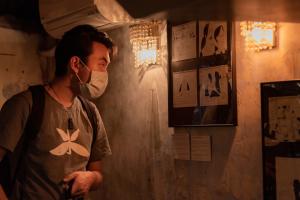Exhibition: Pollution, Data, Activism, 03.20.2021

This collection documents a talk and exhibiton about the Formosa Plastics Global Archive, held on March 20, 2021 at 柏林廢墟Tacheles in Taipei, Taiwan.
Photo Essay: Exhibition 03.20.2021
Photos from a talk and exhibiton about the Formosa Plastics Global Archive, held on March 20, 2021 at 柏林廢墟Tacheles in Taipei, Taiwan. All photos by Jiao Enguan 焦恩光.

pece_annotation_1477258748
tamar.rogoszinskiEmily Goldmann, PhD, MPH, is an Assistant Research Professor of Global Public Health at the College of Global Public Health. Her work focuses on social and environmental determinants of mental health conditions such as posttraumatic stress disorder and depression, as well as the mental health consequences of acute health events. She believes that context is important when thinking about mental health conditions and that the causes of mental illnesses are embedded in all aspects of life. She has also worked as an epidemiologist at the NYC Dept of Health and Mental Hygiene in the Bureau of Adult Mental Health following Hurricane Sandy.
Sandro Galea, MD, MPH, DrPH is a physician and epidemiologist. He is the Robert A. Knox Professor and Dean at the Boston University School of Public Health. He has served as the Anna Cheskis Gelman and Murray Charles Gelman Professor and Chair of the Department of Epidemiology at the Columbia University Mailman School of Public Health. He has also held leadership positions at the University of Michigan and at the New York Academy of Medicine. His interests lie in the social production of health of urban populations, with a focus on the causes of brain disorders such as mood-anxiety disorders and substance abuse. He also works on the consequences of mass trauma worldwide. He has published over 600 scientific journal articles, 50 chapters, and 10 books and has received funding from NIH and CDC. His medical degree is from the University of Toronto, and his graduate degrees are from Harvard and Columbia with an honorary doctorate from the University of Glasgow. He has held several prestigous leadership positions.
pece_annotation_1475372256
xiaoxThe end of the film shows the party before Kiara Lepora leaving. They have the meeting with local doctors and nurses, and they said MSF being there, work and then leave. A people said in the party, ‘I was told people over and over again, do not get used to any expatriate. As they go, other people come. And, do not expect any expatriate to come and stay forever. The work must go on. MSF’s work must go on. We told people that MSF is not about individuals. MSF is about everybody. The work must go on.’ It is a struggle parts for MSF, they want to help more people as they can, but they know they cannot stay there forever, they need to get it done and go back home. I agree and understand what the person said ‘MSF is not about individuals, and the work must go on’, it is most comfort words for each doctors and people who have been through the tough time. This is the most compelling part, because it is not only about the work, but also the human nature and feelings.
pece_annotation_1477962256
tamar.rogoszinskiThe system relies on its developers, as mentioned, for support and information. They are also responsible with creating updated versions in order to provide better functionality, but also keep the information up-to-date and accurate.
pece_annotation_1472839333
tamar.rogoszinski1. Schmid discusses the aftermath of Fukushima and how the workers at the plant lacked expertise in handling this type of disaster, and as a result, retreated. This is an example of the lack of knowledge among workers and lack of an action plan in case a disaster such as the one that occured happens.
2. Schmid points out how world leaders are recognizing the need for a unified and consice nuclear emergency response plan. One of the leaders include Russian nuclear operator, who suggested that international law should force countries operating nuclear plants to abide by international safety standards.
3. She also points out how executives in the nuclear industry create many rules in order to control the workers. They don't necessarily analyze when, why, and by whom rules are broken, but instead implement more rules. When rule-beinding or judgement calls are made, executives try to conceal them instead of learn from them, which is part of the issue at hand. Improvisation is very important. Especially when it emphasizes the expertise of the executives. During an emergency, improvisation would show what experts have experienced and how well they can lead and cooperate.
pece_annotation_1478874622
tamar.rogoszinskiThe main point of this article is that medicine needs human experience through stories and vignettes in order to provide better diagnoses and outcomes for patients. This author highlights the importance for doctors to consider stories and personal anecdotes when deciding what would be best for their patient.
pece_annotation_1476043497
xiaoxThe study address the victims of genaral vulnerable population, especially the low-income people. It shows people are influenced by the disaster and environment changes.

Translation of the event description into Mandarin.